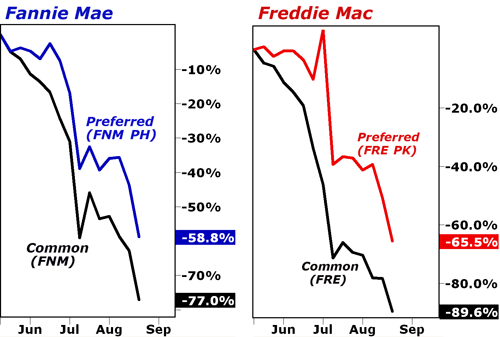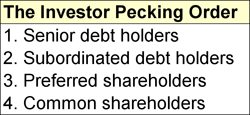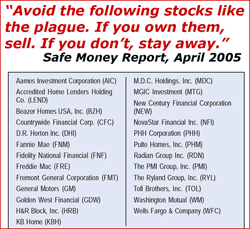The Greatest Government Bailout of All Time
Companies / Credit Crisis 2008 Aug 30, 2008 - 01:23 AM GMT We are now witnessing a rapid-fire 1-2-3 chain reaction of events that's leading to the greatest government bailout of all time ...
We are now witnessing a rapid-fire 1-2-3 chain reaction of events that's leading to the greatest government bailout of all time ...
Event #1. In the mortgage market, where this crisis first erupted, nearly half of all subprime loans issued in 2006 are now delinquent ... late payments on mid-quality "Alt-A" mortgages have soared 41.5% ... and delinquencies on prime jumbo mortgages are up a staggering 55.2% in the past 6 months.
Event #2. At Fannie Mae and Freddie Mac, responsible for over half of the nation's massive mortgage market, losses are mounting so quickly — and so obviously — that even their supposedly "safer" preferred shares are crashing in value:

As you can plainly see in the charts above, since their mid-May high, Fannie Mae's preferred shares (NYSE: FNM PH) are down a shocking 58.8%, falling almost as quickly as the common shares, which have lost 77% of their value.
Freddie Mac's preferred shares (NYSE: FRE PK) have plunged even more: Down 65.5% . (The Freddie common shares, meanwhile, have suffered an 89.6% wash-out!)
And all of this has happened just since May 15, a meager 102 days ago! All in two giant companies that were the darlings of Wall Street, the creation of Washington and supposedly among the most "conservative" investments in the world!
Event #3. At financial institutions across the country, these devastating losses in Fannie and Freddie paper are ripping through balance sheets like an F-5 tornado. That includes:
- Sovereign Bank, the third largest savings and loan in the United States. In our "X" List video , we listed it as a prime candidate for bankruptcy because of its D+ rating and its big exposure to mortgages. Now, it's been revealed that Sovereign has a $632 million stake in Fannie and Freddie preferred shares — the same shares that have lost about two-thirds of their value just since May 15.
- Hundreds of other banks and thrifts. They were encouraged by banking regulators to buy billions of dollars in similar Fannie and Freddie preferred shares. In fact, the regulators thought these investments were so reliable, they let the banks use them for capital that's required as a cushion against loan losses. They even allowed banks to take a tax break on 70% of these securities!
- Countless U.S. brokerage firms, life and health insurers, property and casualty insurers. Some are in good shape. But many have loaded up with similar investments.
- Major financial institutions overseas.
All assumed these shares were safe. All believed they were getting something akin to a government-guaranteed investment. All could be severely disappointed when they discover the truth.
Why a Federal Bailout Is Both Inevitable and Imminent ... But Preferred Shareholders Could Be Very Disappointed
Last week, we heard a feverish crescendo of denials: At Fannie and Freddie, high-ranking company officials vehemently denied they were asking for a government bailout. At the Treasury Department, officials vehemently denied they were providing one. And everywhere, the more they denied, the more it was obvious that a bailout was both inevitable and imminent.
The big dilemma: In any federal bailout of this nature, if the government uses taxpayer dollars to support the value of high-ranking securities (like bonds), it simultaneously destroys the remaining value of the lowest-ranking securities (like common and preferred shares).
Why?
Because the kind of government bailout that's expected is, in itself, a tacit recognition that the companies are bankrupt. And if the companies are bankrupt, it means that, by definition, the shares in the company are worthless.
Right now, banks stuck with Fannie and Freddie preferred shares are hoping for a miracle. Since government regulators encouraged them to buy the Fannie and Freddie preferred shares in the first place, they're praying they will get some consideration.

Sure, these banks and other preferred shareholders are one rank above common shareholders in the pecking order of investors clamoring for a piece of whatever's left over. But they are also two ranks below senior debt holders.
Here's why I think they will be sorely disappointed: Just to bail out Fannie and Freddie's senior debt holders will be such a massive undertaking for the government, it's hard to imagine that there will be much money left over for preferred shareholders.
Moreover, given the magnitude of the collapse in the preferred shares that has taken place just since May 15, even if the government throws them a bone, it will hardly be enough to make up for all the losses they've already suffered in their Fannie and Freddie preferred shares.
End result: A Fannie Mae and Freddie Mac bailout may give temporary relief to some investors. But it will merely spread chaos among most others.
The Catch-22 Question: Where Does The Federal Government Draw The Line?
If the government bails out Fannie and Freddie, will it strictly provide temporary loans of Treasury securities like it has done with the big brokers? Or will it use taxpayer money to inject the permanent capital these companies now require for their long-term survival?
The temporary cash loans require little or no political debate. The Fed acts. The money comes. But the long-term capital investment opens up a pandora's box of objections from Congressional Republicans and Democrats fearful of a mass taxpayer rebellion right on the eve of a major election. Under enough pressure and duress, some money is bound to be forthcoming. But it's bound to have strings attached, including caps, time limits and other restrictions.
No matter what, any bailout will unleash a series of new questions with no answers:
What about Ford, GM and Chrysler?
Think a government bailout for Detroit is far-fetched? The auto executives certainly don't. In fact, just this past Friday, the Wall Street Journal reported that lobbyists for Detroit's Big Three were crowding into the offices of White House officials, U.S. Rep. John Dingell and other Michigan Democrats, giving them a heads up on a bailout proposal to be unveiled after Labor Day.
They want $25 billion in loans. They want to get the money for a cut-rate interest of just 4.5%, one-third what they're now paying. They even want the option to defer any and all payments for up to five years.
With their fortunes sinking fast, and with the nation's major brokers and mortgage lenders already needing handouts, Ford, GM and Chrysler have apparently decided to stake out their place on Uncle Sam's bread line before it gets too much longer.
What about the nation's airlines seeking to make an emergency crash landing?
What about the thousands of local governments that could soon be forced to cut essential services like waste collection or even homeland security?
What about brokers like Lehman Brothers, now scrambling for a foreign white knight to come to its rescue?
What about the big banks we told you about in The "X" List?
Like Fannie and Freddie, each and every one will make the argument that they're critical to the health of the economy and even national defense. All will want cash, loan guarantees, or direct capital injections.
Where will the government draw the line? How will it justify bailouts for some "absolutely essential" private companies but not others?
The answer, my friend, will surprise you.
Even with a Government Rescue, Fannie and Freddie Bond Investors Are STILL in Grave Jeopardy Because ...
1. The quantities of Fannie and Freddie bonds outstanding and needing government support are so massive. According to the Federal Reserve's recently released Flow of Funds (pdf page 96), agency- and GSE-backed securities — mostly issued by Fannie and Freddie — total a whopping $7.6 trillion, or $2.4 trillion MORE than the entire amount of Treasury securities outstanding.
2. These agency- and GSE-backed debts are held so widely around the world, no one in government can control who dumps what, how much, or when. U.S. Commercial banks hold $1 trillion .Insurance companies own another $518 billion. Broker and dealers own $268 billion. Foreign investors hold a whopping $1.5 trillion!
All it takes is for these investors to liquidate 10% of their holdings and the avalanche of supplies on the market would sink their value regardless of the government's efforts to shore up confidence in Fannie and Freddie.
3. Federal bailouts will sink the wobbly market for U.S. Treasury bonds. When private companies are failing, investors rush to the safety of the U.S. Treasury securities. But when the Treasury throws their money into failing companies, investors rush the other way.
Result: To the degree that the government bails out Fannie, Freddie, Detroit, Wall Street, or anyone else, investors in Treasury securities will rebel, dump their own holdings and drive the value of Treasury bonds into a tailspin like none other in history.
And here again, the quantities outstanding are massive ($5.3 trillion) ... the ownership worldwide is far-flung (including nearly half overseas) ... and the ability of the government to control the market, virtually nil.
So, yes, right now, the U.S. Treasury may come to the rescue of Fannie Mae and Freddie Mac debt holders, and these investors will rejoice.
But ultimately, in order to avoid a collapse in U.S. Treasury bonds themselves, the U.S. government will have to
- Draw a line in the sand beyond which no more government rescues will be possible.
- Let some of America's largest banks, brokers and other companies fail, liquidate their assets, and fade into history ...
- Even abandon prior rescue efforts for the sake of saving the one institution it must keep solvent and liquid at all costs: The United States Government itself.
Your best course of action ...
Step 1. Get your savings out of danger and to safety immediately!
 |
 |
We showed you exactly how in our "X" List video.
If you missed it, turn up your computer speakers and click here to watch it now .
Several banks and one brokerage firm on our list are already failing. Others are likely to follow.
Step 2. Clean out your portfolio of financial stocks!
Over three years ago, in April of 2005, we told our Safe Money subscribers to avoid financial stocks like the plague. We even published a list of stocks to get the heck out of immediately. (See the exact reprint of the list at left.)
Nor were we just panning some fly-by-night upstarts. We were telling investors to sell the nation's biggest mortgage lenders like Countrywide Financial, New Century Financial and Washington Mutual ... the largest builders like Beazer Homes, D.R. Horton, and Toll Brothers ... even Fannie Mae and Freddie Mac.
The pundits said we were nuts. But the results prove otherwise:
| Stock | Price in April 2005 When we said "SELL" |
Latest Price* | % Change |
| Aames Investment Corp | 8.00 | 3.52 | -56.0% |
| Accredited Home Lenders | 36.17 | 11.76 | -67.5% |
| Beazer Homes USA Inc | 50.39 | 6.56 | -87.0% |
| Countrywide Financial Corp | 31.80 | 4.25 | -86.6% |
| D.R. Horton Inc | 30.14 | 10.73 | -64.4% |
| Fannie Mae | 53.24 | 4.40 | -91.7% |
| Fidelity National | 26.00 | 13.13 | -49.5% |
| Freddie Mac | 60.85 | 3.25 | -94.7% |
| Fremont General Corp | 22.04 | 0.22 | -99.0% |
| General Motors Corp | 29.38 | 10.16 | -65.4% |
| Golden West Financial Corp | 60.14 | 77.25 | +28.5% |
| H&R Block Inc | 25.18 | 24.93 | -1.0% |
| KB Home | 59.50 | 17.41 | -70.7% |
| MDC Holdings Inc | 71.11 | 39.64 | -44.3% |
| MGIC Investment Corp | 61.03 | 6.82 | -88.8% |
| New Century Financial Corp | 46.54 | 0.01 | -100.0% |
| Novastar Financial Inc | 36.33 | 1.10 | -97.0% |
| PHH Corp | 21.70 | 16.63 | -23.4% |
| PMI Group Inc | 37.81 | 3.22 | -91.5% |
| Pulte Homes Inc | 37.13 | 12.77 | -65.6% |
| Radian Group Inc | 47.30 | 3.31 | -93.0% |
| Ryland Group Inc | 62.93 | 19.70 | -68.7% |
| Toll Brothers Inc | 40.12 | 21.76 | -45.8% |
| Washington Mutual Inc | 39.34 | 4.10 | -89.6% |
| Wells Fargo & Company | 29.72 | 28.92 | -2.7% |
| * For companies still trading, reflects closing price of 8/20/08. If companies that failed or were taken over, reflects last price at that time. | |||
Since that time, almost all of the stocks we panned have crashed and burned:
- Countrywide Financial has fallen 86.6% ...
- New Century Financial shareholders have been 100% wiped out, and ...
- Washington Mutual investors have seen 89.6% of their money go down the drain.
- What about Fannie Mae and Freddie Mac, now at the core of the crisis? They were also on our April 2005 list of financial stocks to dump. And since that date, their common shares have fallen 91.7% and 94.7%, respectively.
With these huge declines, you may think it's now too late to sell your remaining financial stocks. But the fact is, many are still trading at absurdly high price levels. And even those that have been beaten to a pulp could fall another 80% or 90% in value.
Step 3. If you have other assets at risk — stocks, real estate or business properties — hedge against possibly devastating losses ahead with instruments like inverse ETFs or put options. Better yet, if you've cleaned out all of your vulnerable assets, consider using those same instruments to turn this dramatic situation into an equally dramatic profit opportunity.
Good luck and God bless!
Martin
This investment news is brought to you by Money and Markets . Money and Markets is a free daily investment newsletter from Martin D. Weiss and Weiss Research analysts offering the latest investing news and financial insights for the stock market, including tips and advice on investing in gold, energy and oil. Dr. Weiss is a leader in the fields of investing, interest rates, financial safety and economic forecasting. To view archives or subscribe, visit http://www.moneyandmarkets.com .
Money and Markets Archive |
© 2005-2022 http://www.MarketOracle.co.uk - The Market Oracle is a FREE Daily Financial Markets Analysis & Forecasting online publication.



